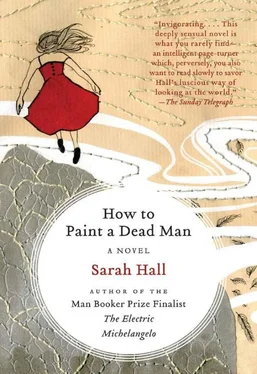Sarah Hall - How to Paint a Dead Man
Здесь есть возможность читать онлайн «Sarah Hall - How to Paint a Dead Man» весь текст электронной книги совершенно бесплатно (целиком полную версию без сокращений). В некоторых случаях можно слушать аудио, скачать через торрент в формате fb2 и присутствует краткое содержание. Год выпуска: 2009, Издательство: Harper Perennial, Жанр: Современная проза, на английском языке. Описание произведения, (предисловие) а так же отзывы посетителей доступны на портале библиотеки ЛибКат.
- Название:How to Paint a Dead Man
- Автор:
- Издательство:Harper Perennial
- Жанр:
- Год:2009
- ISBN:нет данных
- Рейтинг книги:4 / 5. Голосов: 1
-
Избранное:Добавить в избранное
- Отзывы:
-
Ваша оценка:
- 80
- 1
- 2
- 3
- 4
- 5
How to Paint a Dead Man: краткое содержание, описание и аннотация
Предлагаем к чтению аннотацию, описание, краткое содержание или предисловие (зависит от того, что написал сам автор книги «How to Paint a Dead Man»). Если вы не нашли необходимую информацию о книге — напишите в комментариях, мы постараемся отыскать её.
, Sarah Hall, "one of the most significant and exciting of Britain's young novelists" (
), delivers "a maddeningly enticing read... an amazing feat of literary engineering" (
).
How to Paint a Dead Man — читать онлайн бесплатно полную книгу (весь текст) целиком
Ниже представлен текст книги, разбитый по страницам. Система сохранения места последней прочитанной страницы, позволяет с удобством читать онлайн бесплатно книгу «How to Paint a Dead Man», без необходимости каждый раз заново искать на чём Вы остановились. Поставьте закладку, и сможете в любой момент перейти на страницу, на которой закончили чтение.
Интервал:
Закладка:
Maybe he’ll phone him later to see if he and Caron want a pint in the Jerry. It’ll be a nice night to sit out and get mildly loaded and shoot the breeze. Maybe Lydia and the kids will come too and they can all roll home and have a nightcap. He’ll open a new bottle of elderflower. Yeah, he could fancy a pint or two after this. The charcoal’s feeling nice in his hand, fast and loose, and it’s leaving true lines. The wind along the crag ripples the page, and he reaches for a clip from the caddy to hold it down.
Sing once again with me, our strange duet.
Phantom of the bloody Opera. The funny thing is, Donald’s never written about any of it, and this has always surprised Peter. You would expect a writer to draw from such an experience. You’d expect there to be some kind of formal quarrel with what happened, a step into the hazelled ground. At the readings, Peter watches the audience, wonders what they think about that avalanched cheek and inflexible glass orb; whether they have any idea what his scalp looks like under his hair. They never ask. They applaud the ones about snooker and sex. He signs their copies.
Such stark light. He’s caught it on the page — in the slashed fissures and pockmarks, in the crags. Yes. It is a strange profession, the seduction of stone, the attempt to relocate a mountain on to canvas. ‘It’s all geology, Petie,’ is what his old man would probably say. ‘It might not be dollying coal up on conveyors, but the principle’s the same.’ His levelling, lucid father. With the cough that would seem to last for ever, but would cut the man down in a year, halfway through his fifth decade. God bless the black-lunged, shafted miners.
Now the light is tilting. Maybe there’s a better angle to be had. He pockets the charcoal stick and slips the sketchpad inside his shirt, snug against his belly. He leaves the caddy tucked into the alcove of the shelf. Down in the crevice might be best, looking up at the giant. He begins to climb down, dropping over the outcrops, his boot tips slotting into the ledges. It’s a nice feeling in his muscles — the hold, the stretch — though he can feel the morning’s run in his legs. But he could probably make this descent blindfolded, he’s done it so many times. Down, down, twenty feet, thirty. Not too taxing a climb. Not really as sheer as it looks. Soon the grade becomes flatter, opening out into a tumbled skirt of scree and big shingle. He jumps from rock to rock in the bottom of the gorge.
Manoeuvres like this would make Lydia twitchy if she found out about them. ‘You’re not a young buck any more, darling,’ she’d say. ‘What if you lost your balance? What if you slipped and fell and broke your back?’ But heights have never bothered him; if they had, he wouldn’t have managed to fashion the extreme landscapes he has. Clambering about on the summits and ridges feels like second nature — you can’t explain this to someone for whom it’s just plain hairy. He doesn’t have the phobic urge to topple over into the rushing chasm. He doesn’t get the fear. And if he slipped and fell and broke his back, well, it’d be a damn sight preferable to being rear-ended by cancer, or making that long, map-less walk into dementia. In fact, it’s how he’d like to go, given the choice. Not something your cautious wife wants to hear of course. It’s better to let her see a safely finished painting rather than reveal exactly where he made the studies from; which heavenly, inaccessible pinnacle; which granite eyrie.
He retrieves the pad from his smock, now a little damp at the edges with perspiration. A few more quick sketches, then that’ll be him. A good day’s work. The sun sinks on the horizon, crowning the upper striation of the gorge with fierce light.
He removes the clip, flicks back through images. Perfect. Enough. Time to head home now for a nice tea and then a few pints. He stows the pad inside his shirt, makes his way back over the scree. There’s nothing like it, this demob pleasure that comes after accomplishing a task. The giddy satisfaction, feelings of affection for the world. Probably just as good as moving the cows, eh, Mr Robertson. Yeah. They can think he’s nutty. They can think he’s a slacker. This is what it boils down to: knowing you’ve done something useful. Feeling elated and useful, feeling spritely and sure-footed. Feeling the ground beneath you is just.
Then again, the ground beneath him right now feels quite the opposite. It feels infirm; it feels loose. There is a strange sensation, of movement, of motion. The big, lichen-backed stone under his left foot is shifting, rotating. He can hear it grinding rubble as it rolls, tipping him sideways. Given that no one is around to attend to his reaction, it feels absurdly unnecessary when he hears himself say, ‘Woah.’ Time seems bizarrely roomy while this stone-back rodeo is in progress. There is time enough to register a few thoughts. The idea of an earthquake. The striking of flint in the gorge. Lydia, that day she held her finger to her lips and pointed to a stag by the river with bloody velvets. ‘Do you see it, Peter?’ He tries to jump, but the rock has already moved too far. His boot slips. He feels a grazing sting, hears a crack.
It takes an additional epic second for his mind to process the results.
His left leg has been fed into a slim channel between two boulders. The roller has come to a halt above his ankle, no, against his ankle. He has been cast awkwardly to the side and is half kneeling. There is the painful realisation that the accident is bad, then just pain — not ordinary pain, but something vivid and coruscating, as first his shocked silence, then his nauseous whimper, then his primal bellowing attests to. And though an instinctual physiological directive is telling him to get out of the trench, to extract himself pronto from the bite of the rock jaws, he cannot. Because after another deranged few moments of slapping the leg, and yanking it, and trying to lever the raw shin this way and that, excruciatingly, ball-witheringly, it is apparent these are objets d’occlusion, it is apparent that he is, well and truly, trapped. Peter, Peter, Peter.
The Divine Vision of Annette Tambroni
The strongest perfume of all the flowers on the market stall is that of the lilies. The scent has something lush and unsteadying about it. Uncle Marcello prides himself on the successful hot-housing of such flora. He has strains that are very difficult to raise in the soil here. Annette must be careful when handling the lilies — their pollen is worn tremulously and the smallest knock or brush could dislodge it and stain her clothing or the clothing of customers. The strokes of orange and yellow are impossible to remove. When they are in season the lilies have a curious effect. They breathe their scent over everything, their long dusted tongues panting the aroma. The perfume is insistent, a soprano pitch, which lifts above the rest of the bouquets. It tingles the bridge of Annette’s nose when she leans close, making her hands and neck feel soft, like the time Uncle Marcello gave her a tumbler of nocino to sip.
Those who buy lilies behave in a way that suggests dreaminess. They sigh. They sing and hum under their breath. They make unwitting noises, as if enjoying a delicious plate of food. They flirt. All around them are the notes of a peculiar kind of love. Perhaps, if flowers are blessings of God as her mother suggests, the lily serves a different function to the virtuous rose. White lilies are for annunciation and grace, such as the angel offered to the Madonna. But the stargazers and the tigers are vivid and exotic, their shapes and colours voluptuous, and their fragrances intoxicating.
Her mother does not keep lilies in Castrabecco, as she keeps cuttings of other flowers. She finds them extravagant and inappropriate. She says they are too expensive to waste. The white ones are for church, and the others are suitable only for the bordello. Her mother has opinions about the inappropriateness of many things. She has opinions about Annette’s unruly hair braids, about the scandalous price of renting their stall, and the money-raking of the cooperatives, the council and the government. She has things to say about the attire of President Saragat, and the political mistresses. Her firmest opinions are always about what is moral and what is not. And yet she does not often leave the house. She does not investigate for herself the corruptions of Italy, but prefers to read about them at the kitchen table.
Читать дальшеИнтервал:
Закладка:
Похожие книги на «How to Paint a Dead Man»
Представляем Вашему вниманию похожие книги на «How to Paint a Dead Man» списком для выбора. Мы отобрали схожую по названию и смыслу литературу в надежде предоставить читателям больше вариантов отыскать новые, интересные, ещё непрочитанные произведения.
Обсуждение, отзывы о книге «How to Paint a Dead Man» и просто собственные мнения читателей. Оставьте ваши комментарии, напишите, что Вы думаете о произведении, его смысле или главных героях. Укажите что конкретно понравилось, а что нет, и почему Вы так считаете.












